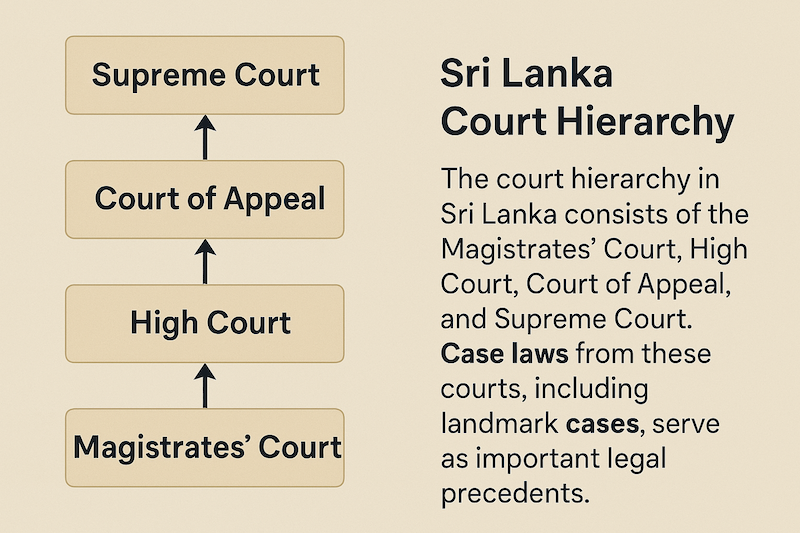
Sri Lanka Court Hierarchy
Sri Lanka has a well-defined court hierarchy that plays a crucial role in the administration of justice. Understanding this structure is essential for anyone interested in the legal system, especially when researching cases or case laws. Whether you’re a law student, researcher, or a citizen trying to navigate the judicial landscape, knowing how courts are structured in Sri Lanka can make your legal journey more informed and efficient.
Supreme Court of Sri Lanka
At the top of the judicial pyramid is the Supreme Court, the highest and final appellate court in Sri Lanka. It hears:
- Constitutional matters
- Final appeals from the Court of Appeal
- Fundamental rights cases
- Presidential references
The Supreme Court’s decisions become binding case laws that shape legal precedent across the country.
Court of Appeal
The Court of Appeal is the intermediate appellate court, responsible for:
- Reviewing decisions from lower courts
- Issuing writs
- Hearing appeals in both civil and criminal cases
This court plays a vital role in refining case laws and ensuring justice is upheld across the judicial system.
High Court
The High Court handles serious criminal cases, including:
- Murder
- Rape
- Drug trafficking
It also functions as a Commercial High Court in certain districts like Colombo, handling high-value commercial cases and disputes.
District Courts
District Courts are primarily civil courts and handle:
- Land disputes
- Divorce cases
- Contractual matters
- Testamentary cases
They are the first tier where most civil disputes are heard and resolved.
Magistrate’s Courts
These are the lowest level courts that deal with:
- Minor criminal cases
- Traffic offenses
- Preliminary inquiries into serious crimes
Magistrate’s Courts are also involved in enforcing orders issued by higher courts.
Importance of Court Hierarchy in Sri Lankan Case Laws
The court hierarchy ensures that case laws evolve through appeals and reviews, helping maintain consistency and fairness in legal rulings. Lower courts are bound by decisions from higher courts, allowing cases to contribute to a dynamic, ever-growing body of Sri Lankan case law.
The Sri Lankan court hierarchy forms the backbone of the country’s legal system. From Magistrate’s Courts to the Supreme Court, each level plays a unique role in resolving cases and developing case laws. Whether you’re referencing a historical judgment or following a current appeal, understanding this structure is key to interpreting the law in Sri Lanka.
Access Sri Lankan Supreme Court cases
Access Sri Lankan Appeal Court cases